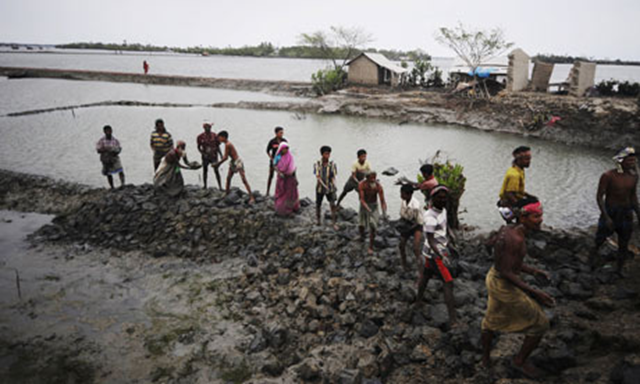‘We have seen the enemy’: Bangladesh’s war against climate change
By John Vidal in Gazipara, www.guardian.co.uk
9 May 2012 Rebecca Sultan’s life has been shattered twice in a few years. First, the 140mph winds of Cyclone Sidr ripped through her village, Gazipara, flattening houses, killing 6,000 people and devastating the lives of millions as it slammed into southern Bangladesh in 2007. Then, 18 months later, as Sultan was recovering, Cyclone Aila tore in from the Bay of Bengal with torrential rains, breaching the coastal embankments and flooding her fields with salt water. Storms of this intensity historically happen in Bangladesh once every 20 to 30 years. But two “super-cyclones” in two years, followed by a narrow escape when super-cyclone Nargis killed 100,000 people in nearby Burma a year later, convinced Sultan and her village, as well as many sceptics in government, that climate change was happening and Bangladesh’s very survival was at stake. Gazipara, like thousands of other villages in coastal Bangladesh, is now racing to adapt to the increased flooding, erosion, and salt-water intrusion. […] “I am quite amazed at how people are grappling with climate change and are adapting,” said Saleemul Huq, a Bangladeshi scientist who is head of the climate change group at the International Institute for Environment and Development in London and an adviser to the Bangladesh government on how to adapt to climate change. “It’s by far the most aware society on climate change in the world,” Huq said. “It has seen the enemy and is arming itself to deal with it. The country is now on a war footing against climate change. They are grappling with solutions. They don’t have them all yet but they will. I see Bangladesh as a pioneer. It has adapted more than any other country to the extremes of weather that climate change is expected to bring.” With the latest research showing more droughts in the country’s north and rising sea levels, more than 30 million Bangladeshis are liable to lose everything from climate change in the next 30 to 50 years, said Atiq Rahman, director of the Bangladesh Centre for Advanced Studies and a lead author of the Intergovernmental Panel on Climate Change’s fourth assessment report. “It’s extreme events, like super-cyclones and the droughts, that will dominate in future, not the mean [average],” Rahman said. “It’s the extra days of heat or cold or the intensity of the cyclones that will affect life most. Poor people cannot wait for global leadership on climate change – they are acting now. They are paying with their own lives, their own resources, their own efforts. They cannot wait. It is not a question of choice.” […] On the coast, Sultan pondered the changes. “The difference we’ve all seen in the weather in just a few years is great. Now we are getting sudden rains, we don’t know when to expect them; the water levels rise faster, the erosion is greater and we are getting more salinity. We used to know when the seasons would change; now they are temperamental. We are resilient and determined to adapt to whatever happens, but it is hard.”
‘We have seen the enemy’: Bangladesh’s war against climate change
